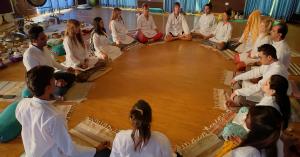India introduces Diploma in Ayurveda for clearer pathways in traditional wellness.
India introduces Diploma in Ayurveda for clearer pathways in traditional wellness.
NY, UNITED STATES, November 14, 2025 /EINPresswire.com/ -- The 3,000-year-old Indian Medicine System draws global attention from health enthusiasts and students for its holistic approach to sustainable living.
The ancient Indian healing science, Ayurveda, is gaining renewed spotlight globally. Ayurvedic schools and institutions in several Indian States are witnessing a steady hype in the enrollment in Ayurveda Diploma Courses. Where once such courses were confined more to the specialists, these Ayurveda Courses are now becoming a part of vast academic conversations about holistic living. Earlier, famous only among Indians, Ayurveda is now winning hearts internationally. The reasons stay the same: the healing concept of Ayurveda, which cures, treats, and prevents health-related problems naturally in the safest way today. This change reflects something bigger. Young students and professionals from all over the world and diverse backgrounds are showing interest in learning the frameworks of this traditional healing technique and how it complements contemporary healthcare. The authorities, like the Ministry of Ayush, and other alliances have encouraged such learning programs in India, paving a path for skill-based learning that preserves this Indian treasure of classical healing knowledge while aligning it with current health requirements. The core concept is the spreading of the health benefits of Ayurveda throughout the world.
Most of the Ayurveda Diploma Courses in India run for 45 to 90 days. This duration can also extend depending on the curriculum and institution. The level of practical exposure in the course also determines its duration. The completion of diploma courses in India is followed by a certification, accepted globally. Therefore, this has opened the doors for the aspirants of Ayurveda Diploma to the global opportunities in the wellness and health industry. Now people are making careers while healing the world with the natural benefits of indian herbs and Ayurvedic medicines. The curriculum often includes the foundational classical texts of Ayurveda, like Sushruta Samhita, Ashtanga Hridya, and more. Students are taught the non-invasive diagnostic methods of Ayurveda, the physiology, the pathology, and the pharmacology of this Indian healing system. The detailed practical sessions are also an important part of an Ayurvedic Diploma in India. The course emphasises herbal medicine preparation, dietary planning, clinical observations, fundamentals of important massages and therapies of Ayurveda like Abhyanga, Shirodhara, and Panchakarma. The course is mostly taught in English to curb the international language barrier. Admission to India’s Ayurveda Diploma Courses requires a degree of higher secondary education, which is 10 + 2. A background in science is like a positive add-on. However, many institutions also admit aspirants from any other educational background as well, provided they have a keen interest in holistic healthcare.
The course is said to provide an academic pathway to enter the global wellness and medicine industry for those incapable of completing a full-time BAMS, Bachelor of Ayurvedic Medicine and Surgery. For those working professionally as Yoga Teachers, Therapists, Spiritual Healers, Nutritionists, and others healing people holistically through similar professions, also pursue this diploma as a continuing course for enhancing their skill-set. The rising interest in Ayurveda is evidence that while some learners see this program as a vocational one, others see it as a cultural education. The course presents how Indians have been using plant science, seasonal routines, herbal therapies, and other community health practices for centuries to attain wellbeing. Educators believe that such Diploma Courses enable future practitioners and researchers to contribute to a more holistic understanding of health. Also, through this, people will continue understanding Ayurveda as a living system instead of a historic relic. The course gives a view of how traditional sciences can coexist with modern disciplines, each working for the better good of humans. The opportunity lies much beyond professional advancement; it is more around knowing a way of healing that continues to address the modern health challenges, holistically.
Amit Kumar
Haritha Ayurveda
info@harithaayurveda.com
Visit us on social media:
LinkedIn
Instagram
Facebook
YouTube
X
Legal Disclaimer:
EIN Presswire provides this news content "as is" without warranty of any kind. We do not accept any responsibility or liability for the accuracy, content, images, videos, licenses, completeness, legality, or reliability of the information contained in this article. If you have any complaints or copyright issues related to this article, kindly contact the author above.

